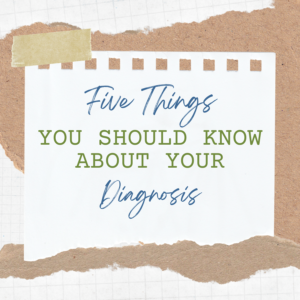5 Things You Should Know about Your Diagnosis

While there are different thoughts and feelings about diagnosis, I wanted to share five things you should know about your diagnosis from a mental health specialist’s perspective.
A diagnosis provides a framework for treatment options.
A diagnosis is an important part of the first two sessions since it helps the therapist conceptualize the presenting concerns and treatment options by categorizing and naming symptoms. Therapeutic interventions, modality of treatment such as individual, family, or couples therapy, considerations if medication would be appropriate, and if so, the type of medication are all determined with the assistance of a diagnosis.
Keep in mind that a diagnosis may be referred to as a “working diagnosis” because it provides a framework for how the therapist conceptualizes what is going on and may change as additional information is available.
A diagnosis is required by insurance companies for reimbursement.
Most people seek therapy because they are struggling with thoughts, feelings, or behaviors that are impacting areas of life such as their work, schoolwork, or relationships. A diagnosis communicates to insurance companies that there is a medical need for mental health treatment. Certain diagnoses may only require short-term therapy, while more severe and persistent mental health concerns often require longer-term care.
A diagnosis may vary over time.
Diagnostic classifications (e.g., anxiety, depression, trauma) can be narrowed down into more specific diagnoses as the therapist gathers more specific information regarding symptoms. Information such as when symptoms began, how often they occur, the intensity of symptoms, and factors such as triggers are gathered.
Some diagnoses may fall in an “Other Specified” category, based on the symptoms reported. For example, someone with a diagnosis in the category of Other Specified Depressive Disorder may be experiencing symptoms of depression but not enough symptoms for a specific diagnosis such as Major Depression. Over time, a person may develop more, or fewer symptoms and the diagnosis can be updated.
A diagnosis can be empowering rather than stigmatizing.
Understanding Your Diagnosis through psychoeducational learning and connection to resources can help empower you to have information to ask questions and learn about symptom management. If you have specific questions about your diagnosis, please ask questions.
A diagnosis opens opportunities.
Your therapist can help you connect with national and local resources such as online communities and support groups and help direct you to resources that open additional opportunities that are available to you. Certain diagnoses can also assist with accommodations and access to additional support.
Written By: Charlotte Johnson, MA, LPCC
We’re Here to help
Our wellness experts will be happy to take care of you. You can CLICK HERE to schedule an appointment now or call (612)223-8898.
Meet Clinicians
We’re united by our commitment to providing effective, relevant, and innovative mental health support at all stages of your journey. Click Here to find a therapist or find out more about who we are, where we come from, and how we live out CARE’s mission every day.
The professionals at CARE are actively collecting and creating resources to help with what you need and address frequently asked questions. We’re Here for You.
source https://care-clinics.com/5-things-you-should-know-about-your-diagnosis/
No comments:
Post a Comment